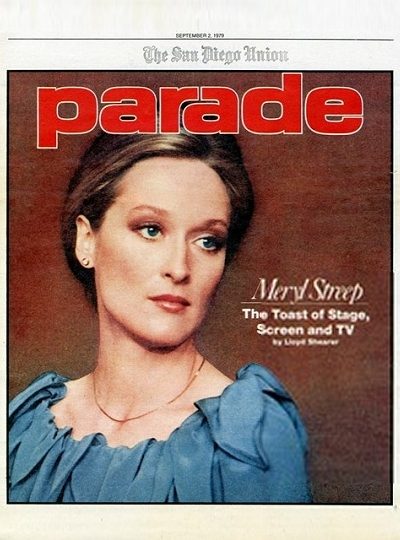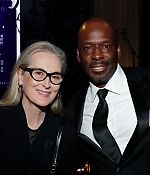
|
America's Hottest Young Actress
Parade Magazine ·
September 02, 1979
· Written by Lloyd Shearer
|

She’s not a ‘sex bomb’and her name is odd, but Meryl Streep’s talent has producers pounding on her door.
Meryl Streep! Recognize the name? If not, don’t worry – you soon will. It belongs to the young actress most in demand by Broadway. Hollywood and TV producers. A tall, blue-eyed, honey-haired blonde of 30 who starred with Robert De Niro in the Oscar-winning film The Deer Hunter, Streep can currently be seen as Woody Allen’s lesbian wife in the film Manhattan and as “the other woman” opposite Alan Alda in The Seduction of loe Tynan, recently released. In a third film, Kramer vs. Kramer, scheduled for release at Christmas, she stars with Dustin Hoffman. In this one she plays a wife who abandons her husband and son, then returns seeking custody of the boy. To date, Meryl (originally Mary Louise) Streep has acted in five motion pictures-her first was a bit part with Vanessa Redgrave and Jane Fonda in Julia. None of these was filmed in Hollywood. Yet there is hardly a Hollywood producer who isn’t eager to cast her in his production. Why, especially when at present the name Meryl Streep on a theater marquee is no draw at the box office? The simple answer is that in knowledgeable show business circles, Streep has earned the reputation as “the hottest young actress in America,” “one of the great talents of our time,” “another Carbo,” “another on stage or screen may recall her as the Catholic girl married to a Jewish husband in Holocaust, a TV miniseries that won her maximum exposure and-an Emmy (which she did not collect in person because, she says, “I don’t believe performances should be Carole Lombard,” “the best American actress since Laurette Taylor, Ina Claire, Katharine Hepburn, Helen Hayes… you name her.”
Explains actor Alan Alda, who also wrote The Seduction of loe Tynan: “Meryl Streep is one actress who enhances and enriches every role she plays. She is an actress of tremendous concentration and talent. In this picture, we have some pretty good actors – Melvyn Douglas, Rip Torn, Barbara Harris -these are not exactly minor league players. But Meryl Streep takes a backseat to no one. When you play a scene with her, she automatically raises the standard. You find that you’ve got to raise your level to hers, no backsliding for even a minute. I found working with her pure joy on both emotional and intellectual levels.” Says Robert Wise, veteran Hollywood director of West Side Story. The Sound of Music and the forthcoming Sfar Trek, a man who is au courant with the latest developments in the drama world: “Meryl Streep represents the new breed of actresses-intelligent, literate, college-educated and well-trained. Her talent does not lie in her chest or hip measurements. The era of Marilyn Monroe, Jayne Mansfield and the other sex bombs is for the time being passe’. “Meryl Streep is in demand because what she adds to a picture is class, class in terms of outstanding performance. Whether that is as marketable as blatant sex appeal in terms of movie box office, we have yet to see. Certainly it’s marketable in terms of the legitimate theater.” Primarily a stage actress and passionately in love with the theater, Streep has been showered with paeans by virtue of her memorable performances in Tennessee’s Williams’s 27 Wagons Full of Cotton, Arthur Miller’s A Memory of Two Mondays, Shakespeare’s The Taming of the Shrew, and at least two dozen other plays. She is a discriminating workaholic who is enormously versatile, soundly trained and naturally photogenic. People who’ve not caught Streep taken out of context and put up against each other for awards”). Bom June 22,1949, in Summit N.J., Meryl Streep is a product of America’s middle class. Until their retirement, her father, Harry Streep II, worked for Merck Pharmaceuticals and her mother Mary ran a graphics business at home.
In high school in Bernardsville, N.J., Meryl was a cheerleader, a member of the swimmingleam, a trained soprano who starred in school musicals, and a blonde good-looking and popular enough to be voted Homecoming Queen. She was not, however, dedicated to or obsessed with the theater, acting or playwrighting. That bent developed when she enrolled at Vassar and signed up for the course “Introduction to Drama,” in which she spoke some of the Blanche Du Bois lines from Tennessee Williams’s A Streetcar Named Desire. Her instructor, Clint Atkinson, was so struck by her performance that he declared Meryl “blessed with talent” and cast her in a series of plays that gradually won the esteem of her peers and departmental honors in drama. On graduation from Vassar- half-infected with the virus of acting- Meryl Streep joined the Green Mountain Guild, a little theater group in Quechee, Vt., where she earned $48 a week acting, directing and promoting a variety of plays, many of them attended by her supportive family. Streep then decided to attend graduate school and chose Yale-where she was given a scholarship, dated the captain of the football team, waited on tables, typed manuscripts and won rave notices from the New York critics who journeyed to New Haven, Conn., to catch her act in The Idiots Karamazov by Albert Innaurato and Christopher Durang. Hers was a virtuoso performance- a 23-year-old girl playing a withering, broken-down octogenarian English translator of Russian novels. She displayed such daring and creativeness that word of her brilliance spread rapidly through the Yale faculty. Kingman Brewster, then president of Yale, said: “Meryl Streep provided me with an unforgettable night in the theater.” And Mel Gussow of The New York Times wrote: “From then on, every time I went to Yale, I looked forward to seeing what Meryl Streep was doing.”
By the time she won her M. A. in fine arts from Yale in 1975, Streep had become somewhat of a legend-a legend that has subsequently marked her as the quintessential actress of integrity who is more interested in the play than the stage, an intellectual actress self-disciplined to resist the temptations of quick fame, easy money and the Hollywood buildup. In discussing stagecraft or aspects of her profession, Streep is frank and forthcoming with journalists. But shift conversational gears to her private life, and she turns off the ignitionmost probably because she knows questions will inevitably arise concerning her tragic love affair with late actor John Cazale. Three years ago, she and Cazale (The Godfather and Dog Day Afternoon) fell in love acting onstage in Measure for Measure. During the two years they lived together, terminal cancer moved in on Cazale. His last film was The Deer Hunter, which happened to be Streep’s first major movie. For her, working in the film was a trying, traumatic, schizoid time. When it was over, she traveled to Vienna to act in Holocaust, then quit work entirely to be with Cazale during his last eight months. It is not the kind of memory a sensitive young woman wants to share with press or public. Last September, Meryl married Donald J. Cummer, a sculptor and fellow Yalie. They live in a large loft in the SoHo district of New York City, to which they returned a few weeks ago after a European trip that began in the spring. Meryl is pregnant with their first child and anticipates a Halloween del ivery-r another facet of her private life she has no intention of publicizing or sharing.
What Meryl Streep is willing -almost compulsively eager-to share, however, is her seemingly boundless acting talent. The one adjective almost all of her directors use to describe it is “phenomenal.” In The Seduction of loe Tynan and the forthcoming Kramer vs. Kramer, filmgoers will have adequate opportunity to judge for themselves. Meryl Streep is the actress of the moment- at least in show business circles and in the eyes of the critics.



Posted on November 17th, 2024
|
Posted on November 7th, 2024
|
Posted on November 1st, 2024
|
Posted on October 10th, 2024
|
Posted on September 26th, 2024
|









